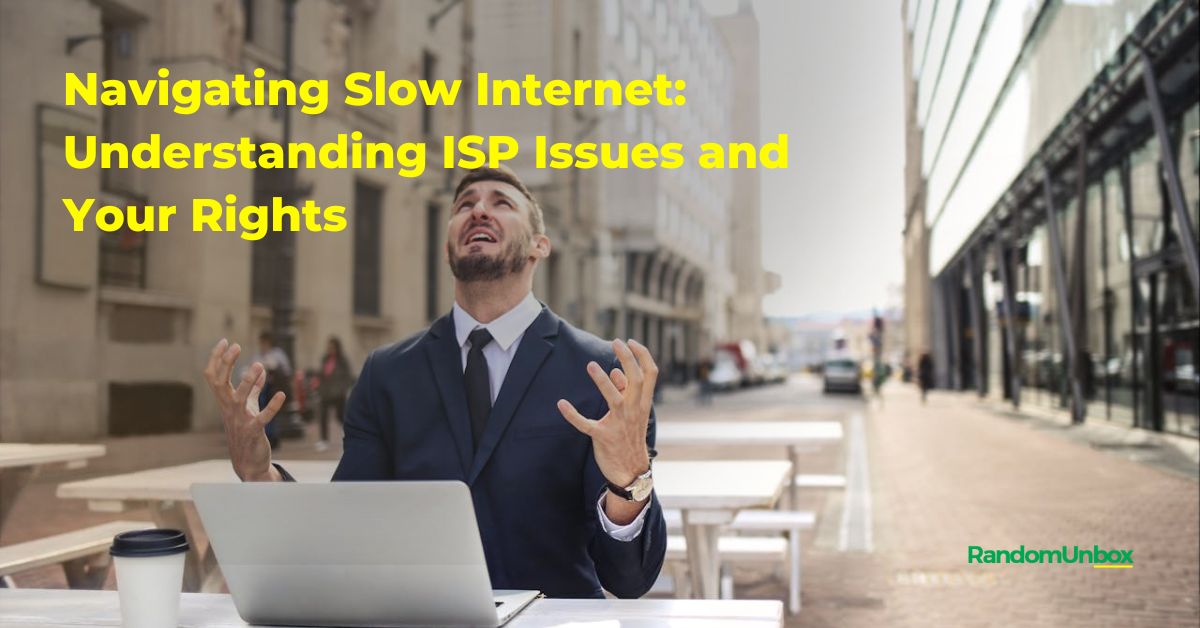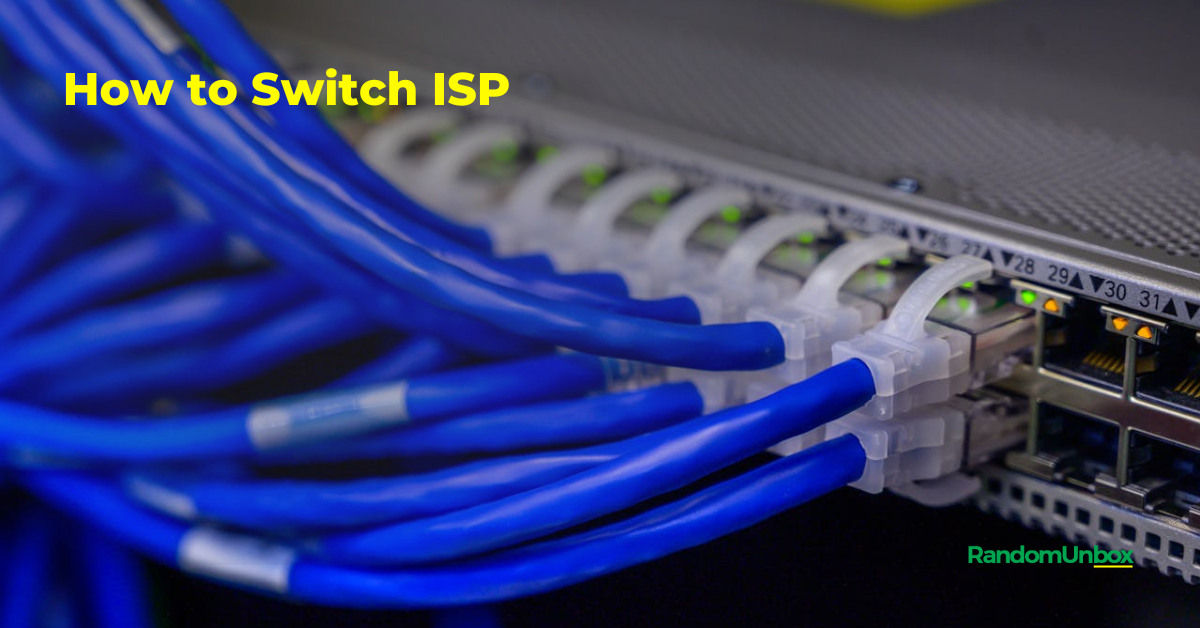Facing sluggish internet speeds from your ISP? You’re not alone. Inconsistent connections and below-par performance can disrupt your daily life and work productivity. But fear not! Here’s a guide to effectively address your concerns and get your internet back on track.
- Know your rights: Familiarize yourself with your ISP’s service agreement and advertised speeds. This information will be crucial when voicing your concerns.
- Gather evidence: Run speed tests using reliable sources like Speedtest.net. Document the results, including dates and times, to provide concrete proof of slowdowns.
- Start with customer service: Contact your ISP’s customer service department. Be polite, factual, and detail your issues, including the documented speed tests.
- Request a technician visit: If the issue persists, request a technician visit to inspect your equipment and network connection. This can help identify any physical problems contributing to the slowdowns.
- Escalate if needed: If you’re unsatisfied with the resolution, consider escalating your complaint to a supervisor or regulatory bodies like the FCC (in the US).
- Consider alternatives: If all else fails, research alternative ISPs in your area. Compare plans, pricing, and customer reviews to find a provider that meets your needs.
Remember, persistence and clear communication are key to resolving slow ISP speeds. By following these steps and advocating for yourself, you can enjoy a faster and more reliable internet connection.
Navigating Slow Internet: Understanding ISP Issues and Your Rights
Facing frustrating internet slowdowns? You’re not alone. Millions of consumers struggle with sluggish speeds that disrupt their online activities. But before throwing in the towel, it’s important to understand the root of the problem and your rights as a customer.
The culprit behind slowdowns could be:
- Network congestion: Imagine a packed highway for data. Too many users can slow things down.
- Equipment issues: Outdated routers or faulty cables can act as bottlenecks.
- Throttling: Some ISPs might restrict speeds during peak hours, leading to frustration.
The good news? You have options:
- Know your rights: The FCC mandates ISPs to deliver advertised speeds. If not, you can file a complaint.
- Pinpoint the cause: Analyze your network, check equipment, and consider contacting your ISP.
- Seek resolution: File a complaint with the FCC if your ISP fails to meet their commitment.
By understanding these factors and your rights, you can:
- Advocate for better service: Hold ISPs accountable to provide the speeds you pay for.
- Enjoy a smoother online experience: Say goodbye to buffering and lag!
Remember: knowledge is power. By taking charge and understanding the reasons behind slow internet, you can navigate these issues effectively and ensure you receive the quality service you deserve.
Before You File: Prepare Your Internet Service Complaint Like a Pro
Facing frequent internet outages or slow speeds? Before filing a complaint, take steps to strengthen your case and ensure a swift resolution. Here’s how:
1. Collect Evidence: Speak the Speed Test Language
- Run regular tests: Use reliable tools like Ookla Speedtest or Google Speed Test.
- Document, document, document: Save test results with dates and times. Track trends to show consistent issues.
2. Know Your Plan: Don’t Get Lost in the Fine Print
- Dig into your plan details: Review advertised speeds, data caps, and service guarantees.
- Armed with knowledge: Understand what you’re entitled to and pinpoint any discrepancies.
3. Organize Your Notes: Be the Master of Your Complaint
- Timeline is key: Create a chronological record of issues, including dates, times, and descriptions.
- Communication matters: Document any contact with the provider, including phone calls, emails, and chat logs.
- Evidence speaks volumes: Keep speed test results, screenshots, and error messages at hand.
By following these steps, you’ll be equipped with a clear, well-documented complaint that increases your chances of a speedy and satisfactory resolution. Remember, the more prepared you are, the stronger your voice!
Contacting Your ISP Customer Support
How to Effectively Contact Your Internet Service Provider
Reaching out to your Internet Service Provider (ISP) can feel daunting, but fret not! This guide equips you with the tools to navigate the process smoothly and efficiently.
Selecting the Right Communication Channel:
- Phone: The classic option, offering immediate interaction. Ideal for urgent issues, but wait times can be long.
- Online Chat: Faster than phone calls, often with shorter wait times. Convenient for quick questions or basic troubleshooting.
- Email: Provides a written record of the conversation and allows for detailed explanations. Best for non-urgent issues or complex concerns.
Communicating Effectively:
- Clarity is Key: Briefly explain the issue, using specific details like error messages, date/time of occurrence, and troubleshooting steps taken.
- Stay Calm and Collected: Patience and assertiveness go hand-in-hand. Raising your voice won’t resolve the issue faster.
- Evidence Speaks Volumes: Screenshots, speed test results, or error logs can strengthen your case and expedite resolution.
Seeking Solutions:
- Troubleshooting Tips: Request guidance on resolving the issue yourself. They may offer steps, tools, or remote diagnostics.
- Upgrade Inquiries: If the issue persists, explore potential upgrades like equipment changes or higher bandwidth plans.
- Service Credits: If the problem stems from the ISP’s end, politely inquire about service credits for downtime or service disruptions.
Remember:
- Knowledge is Power: Familiarity with your plan details, contract terms, and service history can be beneficial.
- Be Polite and Persistent: Courtesy goes a long way. If the first representative can’t help, request escalation to a supervisor.
By following these tips, you’ll be well-equipped to navigate the communication channels, articulate your concerns effectively, and work towards a speedy resolution with your ISP. Remember, a calm and assertive approach is key to a successful outcome!
Filing a Complaint With Regulatory Authorities
When Resolutions Fall Short: Escalation Strategies for Unresolved Complaints
Unsatisfied with your initial attempt to resolve a complaint? Fear not! Here are key steps to ensure your voice is heard and your concerns addressed:
1. Requesting Escalation:
-
Supervisor Intervention: If your initial contact didn’t provide a satisfactory solution, politely request to speak with a supervisor. They often have greater authority and experience to handle complex situations.
-
Formal Complaint: Don’t hesitate to file a formal complaint if the supervisor’s response doesn’t meet your expectations. Documenting your issue creates a clear record for further action.
2. Leveraging Regulatory Resources:
-
Government Agencies: In various countries, regulatory bodies like the FCC (US), FTC (US), or Ofcom (UK) oversee specific industries and handle consumer complaints. Research if your issue falls under their jurisdiction and consider contacting them for assistance.
-
Industry Ombudsmen: Some industries have independent ombudsmen who can investigate unresolved complaints and advocate for fair outcomes. Explore if such resources are available for your situation.
3. The Power of Social Media:
-
Public Platforms: While discretion is crucial, consider using social media platforms to share your experience publicly, especially if you’ve exhausted all other avenues. Public exposure can often prompt companies to address issues swifter.
-
Targeted Engagement: Tag relevant company accounts and industry experts in your posts. This increases visibility and encourages constructive dialogue towards a resolution.
Remember:
-
Clarity: Clearly communicate the nature of your complaint and the actions you’ve already taken. Be factual and concise.
-
Civility: Maintain a respectful and professional tone, even when frustrated. Avoid accusations and inflammatory language.
-
Persistence: Don’t give up easily. Follow up on your inquiries and communicate your intent to escalate if necessary.
By following these steps, you can effectively navigate unresolved complaints and increase your chances of a successful resolution.
| Regulatory Authority | Filing Method |
|---|---|
| FCC | Online complaint form |
| FTC | Online complaint form |
Seeking Alternative Internet Options
When experiencing slow internet speeds, it is essential to explore alternative providers and research local options to determine the best solution for your needs.
Satellite internet, fixed wireless internet, mobile hotspot devices, fiber-optic internet, and DSL internet are all viable alternatives that cater to different requirements and geographic locations.
Explore Other Providers
Consider exploring alternative internet providers in your area to compare available speeds and pricing options. When seeking alternative options, keep in mind the following:
- Check for alternative technologies such as fiber-optic, cable, DSL, or satellite internet for potentially faster speeds.
- Evaluate customer reviews and ratings of different ISPs to gauge their reliability and speed performance.
- Consider mobile hotspot or fixed wireless providers as alternative options for internet connectivity.
- Look into local community broadband initiatives or municipal broadband services for potential high-speed internet alternatives.
- Research other internet service providers in your area to ensure you have access to the best possible service for your needs.
- Negotiate, don’t hesitate: Armed with your research, negotiate with your current provider. Highlight better deals from competitors and politely request a plan or upgrade that aligns with your needs and budget. Remember, the worst they can say is no!
- Switching Fees: Know Before You Go: Switching providers isn’t always seamless. Research potential termination fees, equipment return costs, and downtime to ensure
Research Local Options
Researching local internet service providers can help individuals find alternative options for improving internet speed and service quality. When exploring different providers, consider checking for fiber optic options in your area for faster and more reliable connections. By comparing plans and pricing, consumers can find the best fit for their speed requirements and budget.
Additionally, reading customer reviews and ratings can provide insights into the quality of service and speed performance offered by various ISPs. In areas with limited access to traditional broadband services, satellite internet providers may present a viable alternative. Conducting thorough research on local ISPs is essential for making an informed decision about the internet provider that best meets your needs.
| Provider | Type |
|---|---|
| Fiber Optic | High-speed |
| Satellite Internet | Rural option |
Remember: The right internet service should complement your lifestyle, not drain your resources. By exploring options, negotiating effectively, and understanding the switching process, you can unlock a connection that truly serves you.
Frequently Asked Questions
Can You Complain About Internet Speed?
Yes, complaints about internet speed can be made based on various factors like speed test results, customer service quality, data throttling, contract rights, consumer protection, and service agreement terms. Document issues for effective resolution.
Can You Sue Your ISP for Slow Internet?
Legal action against an ISP for slow internet is possible if services don’t meet advertised standards. Customers’ rights include seeking compensation through a lawsuit based on service agreement violations, with consumer protection laws offering legal recourse.
How Do I Complain to the FCC About My ISP?
When filing a complaint with the FCC about your ISP, adhere to FCC guidelines to ensure proper documentation. Understand customer rights, legal recourse, speed testing, customer support, and regulatory policies to facilitate a fair resolution process.
Does Filing an FCC Complaint Do Anything?
Filing an FCC complaint can have significant regulatory impact, safeguarding customer rights and triggering legal recourse when ISPs fall short of industry standards. This process ensures consumer protection and accountability measures within the telecommunications sector.
Conclusion
Addressing slow internet speeds from your ISP requires meticulous documentation, effective communication with customer support, and, if necessary, escalation to regulatory authorities.
Recap:
- Document the problem: Track slowdowns with speed tests, note timestamps, and log affected activities.
- Contact your ISP: Clearly explain the issue, provide evidence, and reference your service agreement.
- Be polite but firm: Negotiate solutions, escalate if needed, and document all interactions.
- Know your rights: Explore industry regulations and consider filing complaints with regulatory bodies.
- Explore alternatives: Research other providers and consider switching if necessary.
Additional Resources:
- Speed Test Websites: [Speedtest.net], [Ookla Speedtest]
- Consumer Protection Agencies: [FCC (US)], [Ofcom (UK)], [ACCC (Australia)]
- ISP Comparison Tools: [BroadbandNow], [CableTV.com]
Take Action!
You deserve the internet speeds you pay for. By following these steps and using the provided resources, you can effectively complain about slow internet and achieve a resolution. Remember, a slow connection shouldn’t hold you back. Take charge and fight for the internet experience you deserve!










